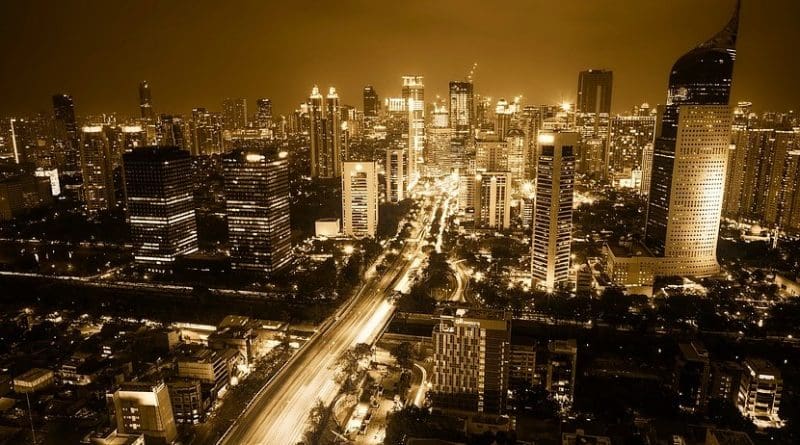Indonesia: Economy Shrinks For First Time Since 1999
By BenarNews
By Ronna Nirmala
Indonesia’s economy shrank during the second quarter – the first time in more than 20 years – officials said Wednesday as travel restrictions to curb the spread of COVID-19 dealt a blow to Southeast Asia’s largest economy.
The country’s gross domestic product contracted 5.32 percent year-on-year, according to data released by the Central Bureau of Statistics (BPS). The negative growth from April through June was the first time the Indonesian economy had shrunk since 1999, when a crippling Asian financial crisis brought about the collapse of the national banking system.
“Looking back on a quarterly basis, this is the lowest since the first quarter of 1999, when the economy contracted 6.13 percent,” Suhariyanto, the head of the statistics bureau, told reporters in Jakarta.
During the second quarter the economy also contracted by 4.19 percent compared with the first quarter, said Suhariyanto, who goes by one name.
The shrinkage was driven by a 5.5 percent year-on-year contraction in household consumption – which represents about six-tenths of gross domestic product, as well as a nearly 9 percent contraction in investment – which represents more than a third of GDP, according to the bureau of statistics.
The overall economic contraction was worse than estimates forecast by government officials earlier.
In June, Indonesia began the gradual reopening of its economy and public life after three months of partial lockdowns in much of the archipelago nation, which is home to 265 million people.
Since then daily cases of COVID-19 have spiked, with new infection clusters being traced back to offices, markets and places of worship.
On Wednesday, the number of newly confirmed coronavirus cases in Indonesia rose to 116,871 after 1,815 infections were reported overnight, with outbreaks in the country’s hotspots showing no signs of flattening. Sixty-four new deaths brought the number of virus-related fatalities to 5,452.
Indonesia, narrowly leads the Philippines as the country in Southeast Asia with the most number of confirmed COVID-19 cases, although cases in the neighboring country have soared in recent days.
Globally, more than 18.6 million coronavirus infections and more than 702,000 deaths have been recorded, according to disease experts at U.S.-based Johns Hopkins University.
Finance minister: No recession yet
Airlangga Hartarto, coordinating minister for the economy, said Indonesia’s economic performance also was affected by a decline in the Chinese economy during the first quarter of 2020.
China, the world’s second largest economy, is Indonesia’s top export destination, accounting for 21 percent of Indonesian exports, followed by the United States with 11.42 percent.
During the first three months of the year, Indonesia’s exports to China fell by nearly 7 percent.
“Of course, we hope that there will be economic recovery in China and other countries,” Airlangga said in a separate teleconference.
The minister said he was optimistic that the economy would improve in the third and fourth quarters, thanks to simultaneous polls scheduled for Dec. 9 in nine provinces, 224 regencies and 37 cities.
The government is spending 24 trillion rupiah (U.S. $1.7 billion) in organizing the elections while candidates are expected to fork out 10 trillion rupiah ($690 million) in campaign expenses, he said.
Despite the contraction in the second quarter, Indonesia has not yet entered a recession, Finance Minister Sri Mulyani Indrawati said.
“This is the first contraction for this year. A recession can occur if the economy contracts for two consecutive quarters,” Sri Mulyani told reporters.
She said she expected the economy to improve in the second half of 2020 with an increase in people’s purchasing power, thanks to stimulus packages for small- and medium-sized enterprises.
“It is hoped that economic growth will remain in the positive zone, between 0 and 1 percent, at the end of the year,” the finance minister said.
Bhima Yudhistira, a researcher at the Institute for Development of Economics and Finance (INDEF), a private think-tank, attributed the contraction to the government’s lack of spending.
“It’s strange that growth in government spending was lower than growth in household consumption in the second quarter,” Bhima said.
“This shows government money was being held up, not disbursed. So don’t be surprised if a recession happens in the third quarter,” he said.
The Finance Ministry has said that only about 19 percent of the government’s 695 trillion rupiah ($48 billion) COVID-19 stimulus funds had been disbursed as of the end of July.
This prompted President Joko “Jokowi” Widodo to urge his ministers to work faster or face dismissal.
Piter Abdullah, director of research at the Center for Economic Reform, predicted a recession but said this should not be a cause for panic.
“Countries that depend on exports are more vulnerable to double-hits,” Piter told BenarNews.
“But all countries are vulnerable, so people do not need to panic. Recessions are becoming the new norm during the pandemic,” he said.
Meanwhile on Wednesday, Jokowi issued an executive order regulating sanctions for violators of COVID-19 health guidelines.
The order stipulates that individuals and businesses could be subject to verbal and written reprimands, social work, fines and suspension of business operations for violating prescribed health protocols, which include requirements to wear masks, wash hands and keep a distance of more than one meter (3.28 feet).

